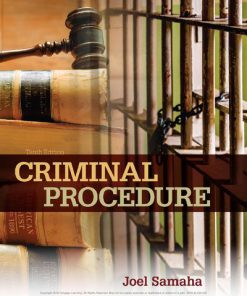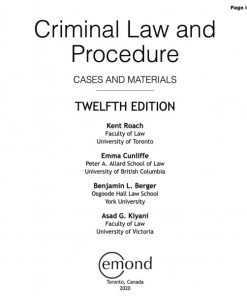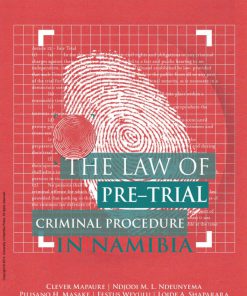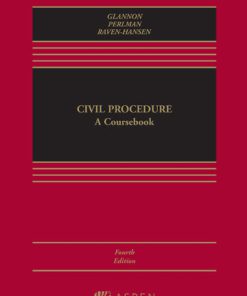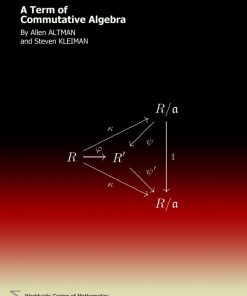Comprehensive Criminal Procedure 5th Edition by Ronald Jay Allen, Joseph L Hoffmann, Debra A Livingston, Andrew D Leipold, Tracey L Meares ISBN 1543804365 9781543804362
$50.00 Original price was: $50.00.$25.00Current price is: $25.00.
Comprehensive Criminal Procedure 5th Edition by Ronald Jay Allen, Joseph L Hoffmann, Debra A Livingston, Andrew D Leipold, Tracey L Meares – Ebook PDF Instant Download/Delivery: 1543804365 ,9781543804362
Full download Comprehensive Criminal Procedure 5th Edition after payment
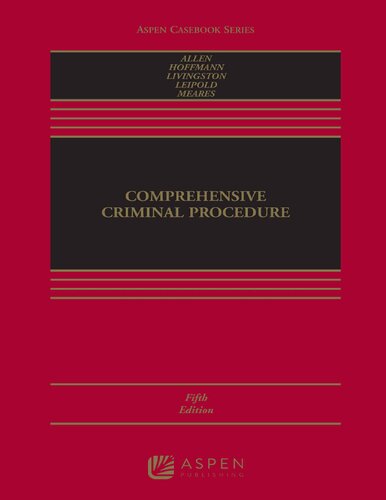
Product details:
ISBN 10: 1543804365
ISBN 13: 9781543804362
Author: Ronald Jay Allen, Joseph L Hoffmann, Debra A Livingston, Andrew D Leipold, Tracey L Meares
Comprehensive Criminal Procedure, Fifth Edition is perfect for all introductory courses in criminal procedure law (including both investigation and adjudication courses, as well as comprehensive and survey courses). The casebook focuses primarily on constitutional criminal procedure law, but also covers relevant statutes and court rules. The casebook is deliberately challenging—it is designed for teachers who want to explore deeply not only the contemporary state of the law, but also its historical and theoretical foundations. The casebook incorporates a particular emphasis on empirical knowledge about the real-world impacts of law-in-action; the significance of race and class; the close relationship between criminal procedure law and substantive criminal law; the cold reality that hard choices sometimes must be made in a world of limited criminal justice resources; and, finally, the recognition that criminal procedure law always should strive to achieve both fairness to the accused and justice for society as a whole. New to the Fifth Edition:
Cutting edge developments in caselaw, statutory material, and academic commentary An important reordering of certain areas of the Fourth Amendment and related materials that make them even more user-friendly Insightful examination of the turmoil in the modern Fourth Amendment cases as the Supreme Court, notably splintered over the appropriate methods of interpreting the Constitution, faces the implications of rapidly changing technology The latest in case law, statutory material, and academic commentary about due process, the right to counsel, pretrial practice, guilty pleas, trial rights, sentencing, double jeopardy, and post-trial procedures Increased emphasis on the role of prosecutorial decision-making An updated treatment of the critical role of plea bargaining A new section on forfeitures and the Eighth Amendment Professors and students will benefit from:
A rigorous and challenging criminal procedure casebook with careful presentation and editing A prestigious author team that incorporates the latest and most highly respected developments in legal scholarship in the field of criminal procedure law An appropriate balance of explanatory text and secondary material Thematic organization structured around important main themes Extensive revisions and updates A casebook that is the only criminal procedure casebook on the market today that enables students to understand the roots of the modern controversy over privacy and security in a digital age
Comprehensive Criminal Procedure 5th Edition Table of contents:
Part One. The Criminal Process
Chapter 1. Introduction to the Criminal Justice “System”
A. Introduction
B. Readings on the Criminal Justice Process
1. Perspectives on the System as a Whole
Packer, The Courts, the Police, and the Rest of Us
Whitman, Presumption of Innocence or Presumption of Mercy?: Weighing Two Western Modes of Justice
Grano, Ascertaining the Truth
Stuntz, The Uneasy Relationship Between Criminal Procedure and Criminal Justice
Garland, The Culture of Control
Muhammad, Condemnation of Blackness: Race, Crime and the Making of Modern Urban America
Steiker, Counter-Revolution in Constitutional Criminal Procedure? Two Audiences, Two Answers
Amar, The Future of Constitutional Criminal Procedure
Tyler, Why People Obey the Law
2. The Distinction Between Criminal Procedure, Civil Procedure, and Substantive Criminal Law
Stuntz, Substance, Process, and the Civil-Criminal Line
3. Plea Bargaining and Sentencing
Langbein, Torture and Plea Bargaining
Alschuler, Implementing the Criminal Defendant’s Right to Trial: Alternatives to the Plea Bargaining System
Wright & Miller, The Screening/Bargaining Tradeoff
Bibas, The Myth of the Fully Informed Rational Actor
4. Some Distributional Consequences of the Criminal Justice System
U.S. Department of Justice, Civil Rights Division, The Ferguson Report
Fagan & Geller, Following the Script: Narratives of Suspicion in Terry Stops and Street Policing
Chacon, Overcriminalizing Immigration
5. The Police
Packer, The Limits of the Criminal Sanction
Harmon, The Problem of Policing
Skolnick & Bayley, Community Policing: Issues and Practices Around the World
Livingston, Police Discretion and the Quality of Life in Public Places: Courts, Communities, and the New Policing
6. The Lawyers and the Trial Courts
Wice, Chaos in the Courthouse: The Inner Workings of the Urban Criminal Courts
Blumberg, The Practice of Law as Confidence Game: Organizational Co-optation of a Profession
Natapoff, Gideon Skepticism
7. The Supreme Court
Amsterdam, The Supreme Court and the Rights of Suspects in Criminal Cases
Chapter 2. The Idea of Due Process
A Brief History
A. Defining Due Process
Hurtado v. California
Notes on the Meaning of “Due Process of Law” in Criminal Cases
B. Incorporation
Duncan v. Louisiana
Notes on Duncan and the Incorporation of the Bill of Rights
C. The Residual Due Process Clause
Medina v. California
Notes and Questions
Hamdi v. Rumsfeld
Notes and Questions
Part Two. The right to counsel—The linchpin of constitutional protection
Chapter 3. The Right to Counsel and Other Assistance
A. The Constitutional Requirements
1. The Right to the Assistance of Counsel at Trial
Gideon v. Wainwright
Notes and Questions
Notes on the Gideon Right to Counsel as Applied to Misdemeanors
Alabama v. Shelton
Notes and Questions
2. The Right to the Assistance of Counsel Before and After Trial
a. When Does the Right to Counsel Begin?
Rothgery v. Gillespie County, Texas
Notes and Questions
Notes on the Right to Counsel at Lineups, Show-Ups, and Photo Arrays
b. When Does the Right to Counsel End?
B. Effective Assistance of Counsel
1. The Meaning of Effective Assistance
Strickland v. Washington
Notes and Questions
Notes and Questions on the Application of Strickland
Notes on Ineffective Assistance, Habeas Corpus, and the Death Penalty
Rompilla v. Beard
Notes and Questions
2. Multiple Representation
Cuyler v. Sullivan
Notes and Questions
Mickens v. Taylor
Notes and Questions
3. Effective Assistance of Counsel and Plea Bargaining
Missouri v. Frye
Lafler v. Cooper
Notes and Questions
4. The Right to Effective Counsel as a Basis for Systemic Reform Litigation
Hurrell-Harring v. State of New York
Notes and Questions
Notes on Fairness, Equality, and the Right to Effective Counsel
Westen, The Empty Idea of Equality
Burton, Comment on “Empty Ideas”: Logical Positivist Analyses of Equality and Rules
C. Autonomy, Choice, and the Right to Counsel
1. The Right to Proceed Pro Se
Notes on Competency and Waiver
Indiana v. Edwards
Notes and Questions
2. The Right to Counsel of One’s Choice
United States v. Gonzalez-Lopez
Notes and Questions
Notes on Forfeiture Statutes and the Right to Counsel
Part Three. The right to be let alone—An examination of the fourth and fifth amendments and related areas
Chapter 4. The Rise, Fall, and Return of Boyd v. United States
Boyd v. United States
Notes and Questions
Schmerber v. California
Warden, Maryland Penitentiary v. Hayden
Berger v. New York
Notes and Questions
Notes and Questions on Doe, Braswell, and Hubbell
Conclusion: Notes on the Future of Boyd
Chapter 5. The Fourth Amendment
Text and History
Remedy and Right
A. Remedies
1. The Exclusionary Rule
Mapp v. Ohio
Notes and Questions
2. Other Remedies
a. Damages
b. Injunctions
c. Criminal Prosecution
d. Administrative and Political Remedies
B. The Scope of the Fourth Amendment
1. The Meaning of “Searches”
a. The Relationship Between Privacy and Property
Katz v. United States
Notes and Questions
Florida v. Riley
Notes and Questions
Florida v. Jardines
Notes and Questions
b. Privacy Exposed
United States v. White
Notes and Questions
California v. Greenwood
Notes and Questions
c. Privacy and Property Redux
United States v. Jones
Notes and Questions
Carpenter v. United States
Notes and Questions
2. The Meaning of “Seizures”
United States v. Drayton
Notes and Questions
California v. Hodari D.
Notes and Questions
C. Justifying Searches and Seizures
The Text (Again)
1. Investigative Warrants
The Oath or Affirmation Requirement
The Magistrate
The Particularity Requirement
The Execution of Warrants
Notes on Warrant Execution
2. The Probable Cause Standard
Illinois v. Gates
Notes and Questions
3. Justifying Searches and Seizures Without Warrants
a. Exigent Circumstances
Mincey v. Arizona
Notes on Exigent Circumstances
Kentucky v. King
Notes and Questions
Brigham City v. Stuart
Notes on Exigency and Community Caretaking
b. Plain View
Arizona v. Hicks
Notes on “Plain View” Doctrine
c. Automobiles
California v. Acevedo
Notes and Questions
Wyoming v. Houghton
Notes and Questions
d. Arrests
Notes on the Scope of the Arrest Power
4. Justifying Searches and Seizures Without Probable Cause or a Warrant: “Consent”
Schneckloth v. Bustamonte
Notes and Questions
Georgia v. Randolph
Notes and Questions
5. Reasonableness and Its Relationship with the Probable Cause and Warrant Clause
a. Administrative Warrants: A Case Study on the Meaning of “Reasonableness”
Camara v. Municipal Court of the City & County of San Francisco
Notes and Questions
b. Stops and Frisks
Terry v. Ohio
Notes and Questions
Notes on the Refinement of “Stop and Frisk”
Notes on the Meaning of Reasonable Suspicion
Florida v. J.L.
Notes and Questions
Navarette v. California
Notes and Questions
Illinois v. Wardlow
Notes and Questions
c. Police Discretion and Street Policing
Kennedy, Race, Crime and the Law
Tyler & Wakslak, Profiling and Police Legitimacy: Procedural Justice, Attributions of Motive, and the Acceptance of Social Authority
U.S. Department of Justice, Civil Rights Division, Guidance For Federal Law Enforcement Agencies Regarding the Use of Race, Ethnicity, Gender, National Origin, Religion, Sexual Orientation or Gender Identity
Whren v. United States
Notes and Questions
Atwater v. Lago Vista
Notes and Questions
Notes on Police Discretion and Substantive Criminal Law
Chicago v. Morales
Notes and Questions
6. Evaluating Individualized Suspicion
a. Searches Incident to Arrest
Chimel v. California
Notes and Questions
Arizona v. Gant
Notes and Questions
Riley v. California
Notes and Questions
b. Checkpoint Seizures
Indianapolis v. Edmond
Notes and Questions
c. “Special Needs,” Regulatory, and Administrative Searches
Maryland v. King
Notes and Questions
City of Los Angeles v. Patel
Notes and Questions
D. Reasonableness and Police Use of Force
Tennessee v. Garner
Notes and Questions
Graham v. Connor
Notes and Questions
E. The Scope of the Exclusionary Rule
1. The “Good Faith” Exception
United States v. Leon
Notes and Questions
Herring v. United States
Notes and Questions
Davis v. United States
Notes and Questions
2. “Standing” Doctrine
Minnesota v. Carter
Notes and Questions
3. “Fruit of the Poisonous Tree” Doctrine
Wong Sun v. United States
Notes and Questions
Notes on “Fruit of the Poisonous Tree” Doctrine
Utah v. Strieff
Notes and Questions
Murray v. United States
Notes on the “Independent Source” and “Inevitable Discovery” Doctrines
4. Impeachment
United States v. Havens
Notes and Questions
Chapter 6. Criminal Investigations in the Fourth Amendment’s Shadow
A. Electronic Surveillance and the Search of Digital Information
1. Wiretapping and Related Electronic Surveillance
Title III Notes and Questions
2. Search and Seizure Under the Stored Communications Act
United States v. Warshak
Notes and Questions
3. Search and Seizure of Digital Information Under General Warrant Provisions
United States v. Werdene
Notes and Questions
B. Undercover Agents and Entrapment
Jacobson v. United States
Notes and Questions
Chapter 7. The Fifth Amendment
Text and History
A. The Fifth Amendment Privilege Against Self-Incrimination and Its Justifications
Counselman v. Hitchcock
Kastigar v. United States
Notes and Questions
B. The Contours of the Privilege Against Self-Incrimination
1. “No Person . . . Shall Be Compelled”: The Meaning of Compulsion
2. “In Any Criminal Case”: The Meaning of Incrimination
United States v. Ward
Notes on the Meaning of Incrimination
3. “To Be a Witness Against Himself”: The Meaning of Testimony
4. The Rule that the Fifth Amendment Privilege Must Be Asserted
Salinas v. Texas
Notes and Questions
C. Limiting, or Expanding, the Fifth Amendment Privilege?
Baltimore City Department of Social Services v. Bouknight
Notes and Questions
D. Police Interrogation
1. The Miranda Revolution
Notes on the Due Process Voluntariness Test
Watts v. Indiana
Massiah v. United States
Escobedo v. Illinois
Miranda v. Arizona
Notes and Questions
2. The Scope of Miranda
a. “Custody”
J.D.B. v. North Carolina
Notes and Questions
b. “Interrogation”
Rhode Island v. Innis
Notes and Questions
Illinois v. Perkins
Notes and Questions
c. Warnings
d. Invocations
Michigan v. Mosley
Edwards v. Arizona
Notes and Questions
e. Waivers
Moran v. Burbine
Notes and Questions
Berghuis v. Thompkins
Notes and Questions
Note on Miranda’s Practical Effects
3. The Consequences of a Miranda Violation
Dickerson v. United States
Notes and Questions
Missouri v. Seibert
United States v. Patane
Notes and Questions
4. The Right to Counsel Reconsidered
Brewer v. Williams
Notes and Questions
Part Four. The Adjudication process
Chapter 8. The Charging Decision
A. Prosecutorial Discretion
1. The Decision to Charge
Inmates of Attica Correctional Facility v. Rockefeller
Notes and Questions
2. Selecting the Charge
United States v. Batchelder
Notes and Questions
B. Limits on the Charging Power
United States v. Armstrong
Notes and Questions
Chapter 9. Bail and Pretrial Detention
A. Bail Amounts
Stack v. Boyle
Notes and Questions
B. The Bail Reform Act and Preventive Detention
United States v. Salerno
Notes and Questions
Chapter 10. Pretrial Screening and the Grand Jury
A. Preliminary Hearings
B. Grand Juries
1. Background and Current Practice
2. Grand Jury Review
Costello v. United States
Notes and Questions
United States v. Williams
Notes and Questions
C. Grand Jury Investigations
1. Grand Jury Secrecy
a. Scope of the Rule
In re Sealed Case No. 99-3091
Notes and Questions
b. Exceptions to the Secrecy Rule
2. The Subpoena Power
United States v. Dionisio
Notes and Questions
United States v. R. Enterprises, Inc.
Notes and Questions
3. Limits on the Investigative Powers
a. Immunizing Testimony
Notes and Questions
b. Documents and the Act of Production
United States v. Hubbell
Notes and Questions
Chapter 11. The Scope of the Prosecution
A. The Right to a Speedy Trial
Barker v. Wingo
Notes and Questions
Doggett v. United States
Notes and Questions
B. Venue
1. Location of the Crime
United States v. Rodriguez-Moreno
Notes and Questions
2. Changes of Venue
Skilling v. United States
Notes and Questions
C. Joinder and Severance
United States v. Hawkins
Notes and Questions
Zafiro v. United States
Notes and Questions
Chapter 12. Discovery and Disclosure
A. Disclosure by the Government
1. The Prosecutor’s Discovery Obligations
Federal Rules of Criminal Procedure: Rule 16
Notes and Questions
2. The Prosecutor’s Constitutional Disclosure Obligations
Kyles v. Whitley
Notes and Questions
United States v. Ruiz
Notes and Questions
B. Disclosure by the Defense
Williams v. Florida
Notes and Questions
C. Sanctions for Nondisclosure
Taylor v. Illinois
Notes and Questions
Chapter 13. Guilty Pleas and Plea Bargaining
A. The Guilty Plea
1. Rule 11 and the Plea Process
a. Knowing
Notes and Questions
b. Voluntary
c. Factual Basis
North Carolina v. Alford
Notes and Questions
2. The Effect of a Guilty Plea
Class v. United States
Notes and Questions
B. Plea Bargaining
1. History and Practice
Langbein, Understanding the Short History of Plea Bargaining
Notes and Questions
Fisher, Plea Bargaining’s Triumph
Notes and Questions
Heumann, Plea Bargaining: The Experiences of Prosecutors, Judges, and Defense Attorneys
Notes and Questions
2. Inducements to Plead
Bordenkircher v. Hayes
Notes and Questions
3. The Subject Matter of Plea Bargaining
United States v. Hodge
Notes and Questions
Newton v. Rumery
Notes and Questions
4. Interpreting and Enforcing Guilty Pleas and Plea Bargains
a. Plea Withdrawal
b. Breach of the Plea Deal
Santobello v. New York
Notes and Questions
Ricketts v. Adamson
Notes and Questions
C. The Role of Defense Counsel
Chapter 14. The Jury and the Criminal Trial
A. The Right to a Trial by Jury
Ballew v. Georgia
Notes and Questions
B. Jury Composition
Notes and Questions on the Impartiality Requirement
1. The Fair Cross Section Requirement
Duren v. Missouri
Notes and Questions
2. Equal Protection and the Peremptory Challenge
Batson v. Kentucky
Notes and Questions
Flowers v. Mississippi
Notes and Questions
C. The Defendant’s Trial Rights
1. The Right to Be Present, to Testify, to Obtain Evidence, and to Present a Defense
2. The Confrontation Clause
a. The Crawford Revolution
Crawford v. Washington
Davis v. Washington
Notes and Questions
Michigan v. Bryant
Notes and Questions
b. The Bruton Rule
Gray v. Maryland
Notes and Questions
D. Influences upon the Jury
Darden v. Wainwright
Notes and Questions
E. Proof and Verdict Issues
1. The Burden of Proof
2. Unanimity of the Verdict
3. Consistency of the Verdict; General Verdicts
4. Impeachment of the Verdict
Peña-Rodriguez v. Colorado
Notes and Questions
5. Post-Verdict Motions
Part Five. Post-trial proceedings
Chapter 15. Sentencing
A. Introduction to Sentencing
1. Sentencing Options
2. Sentencing Considerations
3. Substantive Limits on Sentencing — Eighth Amendment Proportionality
Ewing v. California
Notes and Questions
Roper v. Simmons
Notes and Questions
B. Discretion and Rules in Sentencing
Frankel, Lawlessness in Sentencing
U.S. Department of Justice, Bureau of Justice Statistics, Special Report: “Truth in Sentencing in State Prisons”
Tacha, Serving This Time: Examining the Federal Sentencing Guidelines After a Decade of Experience
C. Do the Rules of Constitutional Criminal Procedure Apply to Sentencing?
Williams v. New York
Notes and Questions
Notes on Determinate Sentencing and the Constitution
Blakely v. Washington
United States v. Booker
Notes and Questions
Gall v. United States
Notes and Questions
D. Forfeitures and the Eighth Amendment
Austin v. United States
Notes and Questions
Chapter 16. Double Jeopardy
A. “Twice Put in Jeopardy”
1. Acquittals
Fong Foo v. United States
Notes on the Special Status of Acquittals
Ashe v. Swenson
Notes and Questions
2. Mistrials
Oregon v. Kennedy
Notes and Questions
B. “For the Same Offence”
Notes on the Rise, Fall, and Rise of the Blockburger Test
United States v. Dixon
Notes and Questions
Notes on Sentencing and the Meaning of “the Same Offence”
C. Double Jeopardy and the “Dual Sovereignty” Doctrine
Heath v. Alabama
Notes and Questions
D. Double Jeopardy and the Criminal-Civil Divide
United States v. Ursery
Notes and Questions
Chapter 17. Appellate and Collateral Review
A. Appellate Review
1. The Defendant’s Right to Appeal
2. The Prosecution’s Right to Appeal
3. Interlocutory Appeals
4. What Law Applies?
5. Prejudice and Harmless Error
Chapman v. California
Notes and Questions
B. Collateral Review
1. The “Great Writ” of Habeas Corpus
2. The Nature and Purposes of Federal Habeas
Terry Williams v. Taylor
Notes and Questions
3. Procedural Issues in Federal Habeas
a. Timing
b. Exhaustion
c. Procedural Default
Wainwright v. Sykes
Notes and Questions
d. Successive Petitions and Abuse of the Writ
e. The “Fundamental Miscarriage of Justice” Exception
f. Evidentiary Hearings
4. What Law Applies?
Stone v. Powell
Notes and Questions
5. Prejudice and Harmless Error
Brecht v. Abrahamson
Notes and Questions
6. Innocence and the Future of Federal Habeas
United States Constitution (Selected Provisions)
People also search for Comprehensive Criminal Procedure 5th Edition:
comprehensive codes
criminal procedure clause
examples of criminal procedure
wpic criminal negligence
criminal procedure vs criminal law
Tags: Ronald Jay Allen, Joseph L Hoffmann, Debra A Livingston, Andrew D Leipold, Tracey L Meares, Criminal Procedure
You may also like…
Uncategorized
Transportation and National Defense 1st Edition by Joseph L White ISBN 9781512808544 1512808547
Jurisprudence & Law - Criminal Law & Procedure
Jurisprudence & Law - Criminal Law & Procedure
History - Archaeology
Geology for Archaeologists A Short Introduction 1st Edition J R L Allen
Uncategorized
The Law of Pre Trial Criminal Procedure in Namibia 1st Edition Clever Mapaure M L Ndjodi
Uncategorized
Jurisprudence & Law - Courts & Trial Practice
Romance - Paranormal Romance
Wild Vamp Jaded Vamp 2 1st Edition by LD Wosar ISBN B091J5R8FS
Mathematics - Algebra
A Term of Commutative Algebra Allen B. Altman And Steven L. Kleiman




